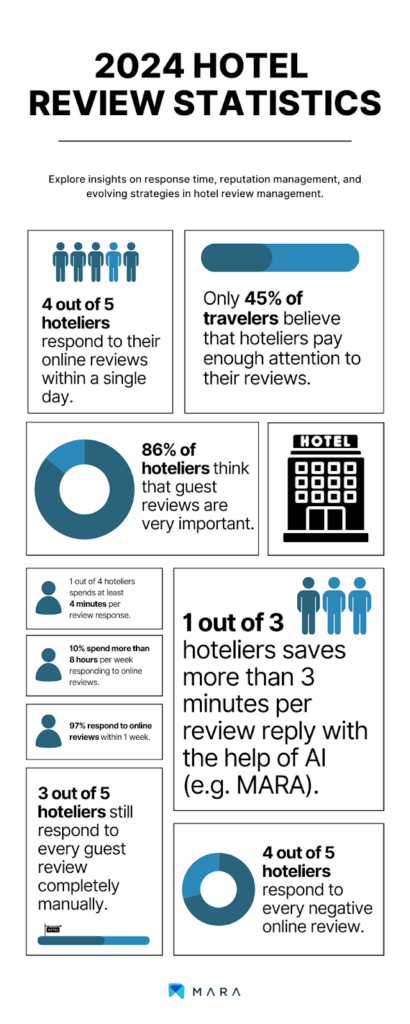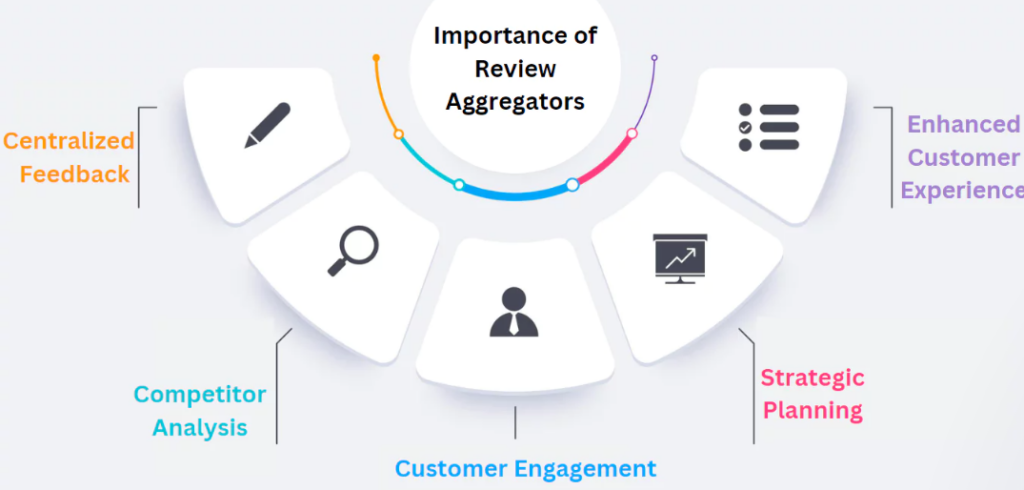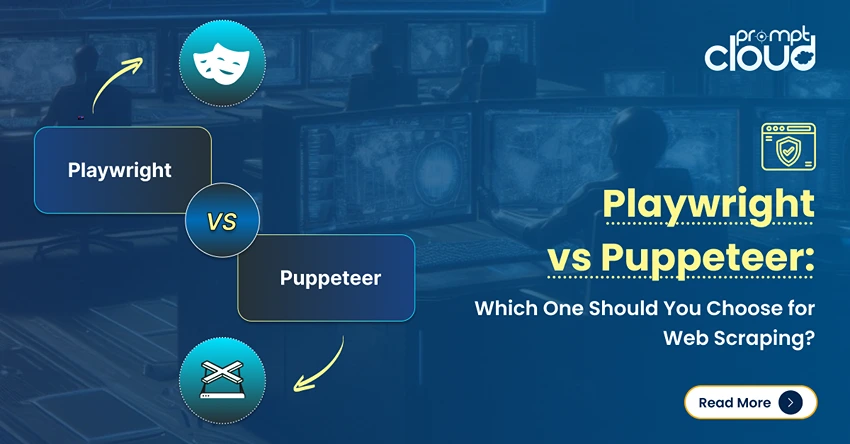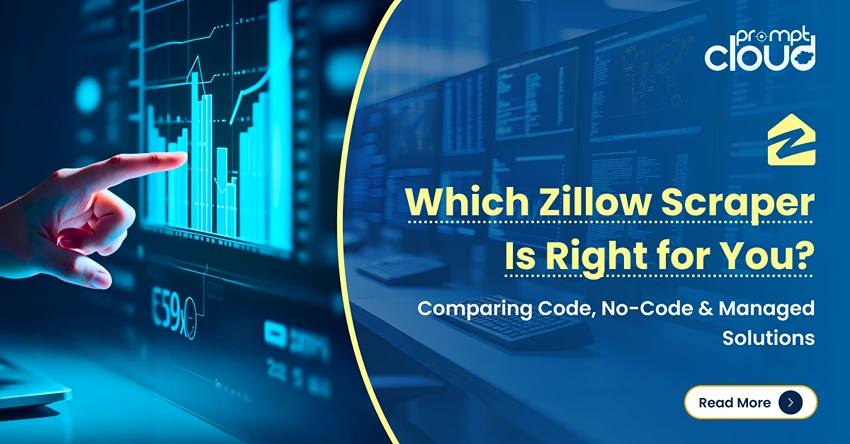
Why Guest Reviews Matter More Than Ever?
In today’s digital era, guest reviews can make or break a hotel’s reputation. Booking.com reviews for hotels offer a goldmine of insights into customer sentiment, expectations, and experiences. However, manually sifting through thousands of reviews is impractical, especially when you want to analyze trends and patterns at scale. This is where web scraping comes in – offering an efficient, automated way to aggregate reviews and derive meaningful insights.
If you’re in the hotel industry, leveraging automated review aggregation from Booking.com can elevate your guest experience strategy, giving you a competitive edge. Let’s explore how it works and why it’s essential.

Source: MARA Solutions
How Review Aggregation Boosts Guest Satisfaction in Hotels?

Source: Vervotech
Booking.com reviews for hotels aren’t just ratings and opinions; they’re real-time feedback from the very people you want to impress.
By analyzing this feedback, you can:
- Understand guest expectations and preferences
- Identify common pain points and areas for improvement
- Spot opportunities for service enhancements
- Measure the impact of changes or new initiatives
However, without a structured approach, analyzing this data can be overwhelming. Web scraping simplifies this process by automatically extracting reviews, compiling them, and providing structured data that can be analyzed easily.
How to Effectively Scrape Reviews from Booking.com?
Web scraping is the process of extracting data from websites in an automated, systematic manner. For hotels, scraping Booking.com reviews can involve gathering a range of data, including:
- Star ratings for overall satisfaction
- Guest sentiments expressed in review text (e.g., “Loved the service!” or “Room was too small.”)
- Specific mentions of amenities (e.g., “Great breakfast options!” or “Wi-Fi was too slow.”)
- Comments on staff interactions, room quality, and other critical factors
The extracted data is then cleaned, categorized, and analyzed to uncover valuable insights about guest preferences and behavior.
What are the Benefits of Review Aggregation for Hotels?
- Understand Guest Sentiment with Precision

Guest sentiment analysis is one of the most significant advantages of review aggregation. Web scraping Booking.com reviews for hotels allows you to:
- Detect positive and negative sentiment based on review content, helping you understand overall guest satisfaction.
- Identify sentiment trends – e.g., whether comments about cleanliness, staff behavior, or amenities are improving or declining over time.
- Compare guest sentiment across different periods (e.g., before and after launching a new service) to measure the impact of changes.
By understanding how guests truly feel, you can make more informed decisions about service enhancements and prioritize changes that align with guest expectations.
- Identify Common Pain Points and Areas for Improvement
Negative reviews often point to recurring issues that require immediate attention. By scraping and analyzing these reviews, you can:
- Pinpoint specific areas that need improvement – for example, complaints about room cleanliness, slow check-in processes, or subpar dining options.
- Identify operational bottlenecks based on frequent complaints, allowing you to focus resources on resolving core problems.
- Set actionable goals by tracking the frequency of specific issues over time and monitoring the effectiveness of interventions.
With this level of insight, hotels can implement targeted changes that address the most common concerns, leading to better guest satisfaction.
- Enhance Personalized Guest Experiences
Review aggregation can also reveal what guests love most about your hotel, whether it’s the friendly staff, spacious rooms, or complimentary breakfast. By focusing on these positive aspects, you can:
- Enhance services that guests appreciate, further improving satisfaction levels.
- Personalize guest experiences based on common preferences, like offering room upgrades to frequent business travelers or promoting family-friendly amenities to vacationers.
- Identify new service opportunities based on positive feedback trends—e.g., if guests often praise the spa services, consider promoting it more prominently or offering exclusive packages.
By tailoring services to match guest preferences, hotels can create personalized experiences that leave a lasting impression.
- Measure Competitor Performance and Benchmarking
Web scraping doesn’t have to be limited to your hotel’s reviews. You can also scrape and analyze reviews on Booking.com of competitor hotels to understand:
- How your competitors are performing in key areas, like customer service, cleanliness, and amenities.
- Where you stand in comparison, allowing you to benchmark performance and set competitive goals.
- What competitors are doing well, helping you adopt best practices that can enhance your offerings.
This competitive analysis helps hotels stay ahead by identifying strengths and weaknesses within the market, enabling more effective positioning strategies.
Real-Life Example: How a Leading Hotel Chain Leveraged Review Aggregation?
One leading hotel chain used automated review aggregation to enhance its guest experience strategy significantly.
By scraping Booking.com reviews, the hotel chain was able to:
- Identify a recurring issue with room cleanliness, leading to retraining staff and stricter housekeeping protocols.
- Spot a trend of guests praising the complimentary breakfast, prompting the chain to expand menu options and promote it further in marketing campaigns.
- Measure the impact of a new loyalty program by analyzing positive sentiment among frequent guests.
The result? A noticeable improvement in guest satisfaction, increased positive reviews, and a boost in repeat bookings.
Best Practices for Web Scraping Booking.com Reviews
To maximize the benefits of review aggregation, it’s essential to follow best practices:
- Ensure compliance with data protection laws (e.g., GDPR) and Booking.com’s terms of service to avoid legal issues.
- Use rotating IPs and proxies to prevent IP blocks while scraping data.
- Implement sentiment analysis tools to automatically categorize and interpret review content, making insights actionable.
- Regularly update scraping processes to adapt to changes in Booking.com’s website structure and review formats.
By adhering to these best practices, hotels can gather accurate, real-time data without disruptions.
Conclusion
Review aggregation through web scraping is no longer a luxury; it’s a necessity for hotels looking to stay competitive and enhance guest experiences. By extracting and analyzing data from Booking.com, you can unlock valuable insights into guest sentiment, pinpoint areas for improvement, and create personalized experiences that delight your guests.
Ready to elevate your hotel’s guest experience strategy? Discover how PromptCloud’s automated web scraping solutions can help you aggregate, analyze, and act on Booking.com reviews like never before. Schedule a demo now.



















